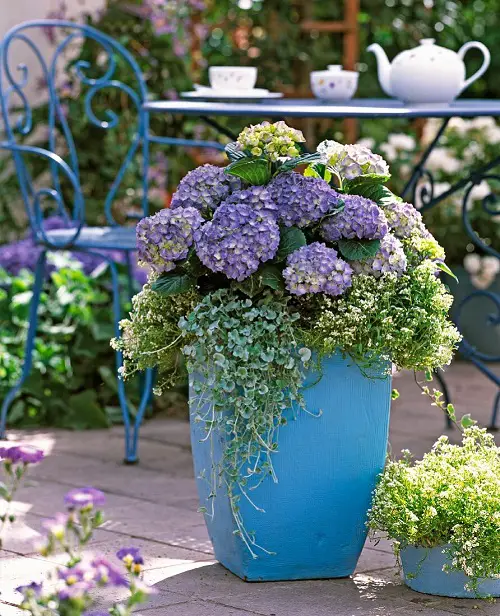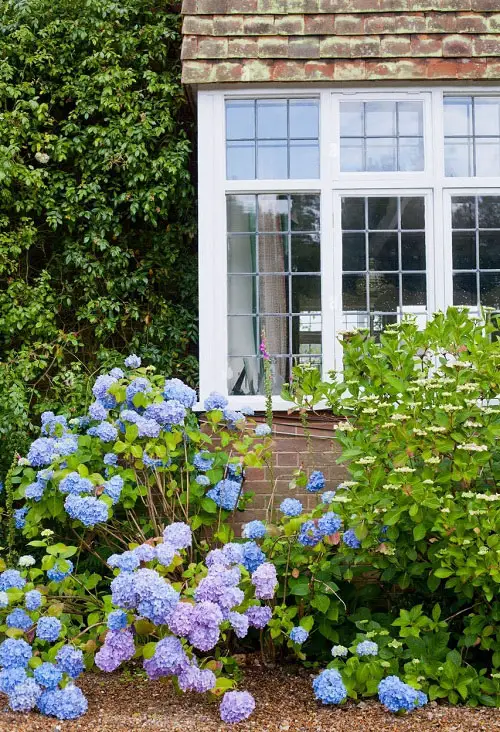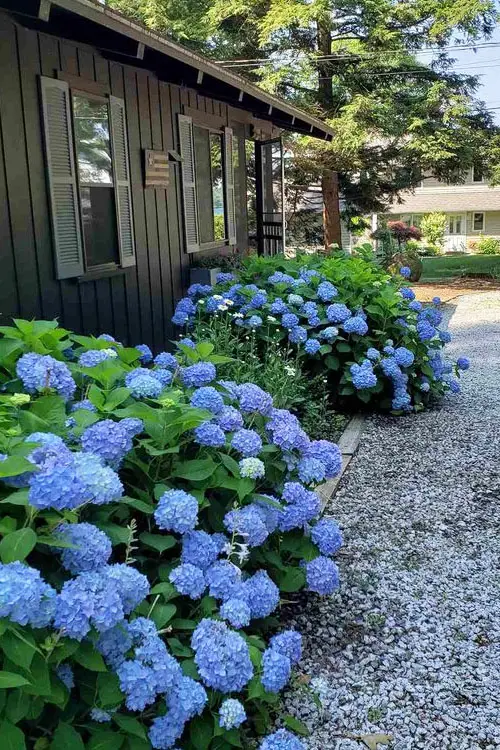Want to know What Side of the House You Need to Plant Hydrangeas for the best growth and more blooms? We have all the details!
Hydrangeas are popular flowering shrubs renowned for their vibrant blooms and lush foliage. When deciding about the location to plant hydrangeas in your garden, it is crucial to consider various factors that can influence their growth and overall health. So, What Side of the House Do You Plant Hydrangeas? Time to find out!
Learn Growing Hydrangeas from Cuttings here
Growing Requirements of Hydrangeas
- Most hydrangea varieties thrive in a combination of partial to filtered sunlight. Some cultivars do well even in full sunlight if the climate is cool. Usually, they prefer bright, indirect light, especially in the afternoon, rather than direct, intense sunlight (more particularly in USDA Zones 9 and above).
- Morning and evening sunlight and some dappled shade in the afternoon are ideal.
- Afternoon shade is important, as it helps protect hydrangeas from the hottest part of the day and reduces the risk of leaf burn or dehydration.
- Choosing a planting location that offers natural windbreaks, such as buildings, fences, or dense shrubs, to shield hydrangeas from strong winds and storms is also required, especially if the place lacks dense planting.
- Consider installing physical windbreaks, such as trellises, barriers, or windbreak fences, to shield hydrangeas from prevailing winds or grow more shrubs together. This can help create a more favorable growing environment.
- What Side of the House Do You Plant Hydrangeas – The BEST Location
East facing location is BEST for growing hydrangeas.
East-facing locations receive morning sunlight, which is ideal for hydrangeas. The intensity of the morning sun is typically milder compared to the harsher afternoon sun. This allows hydrangeas to receive sufficient light without being subjected to excessive heat and potential sunburn.
In east-facing locations, hydrangeas benefit from natural shade during the hotter part of the day. As the sun moves westward throughout the day, buildings, trees, or other structures provide shade and protection, helping to prevent dehydration and heat stress.
An east-facing location often allows hydrangeas to retain moisture for longer periods. The soil tends to remain moist from overnight irrigation or morning dew, providing a favorable growing environment for hydrangeas, which prefer consistent soil moisture.
The eastern side can also shield hydrangeas from extreme weather conditions, such as strong winds. This protection contributes to the overall health and well-being of the plants.
What Side of the House Do You Plant Hydrangeas – According to Species
- Hydrangeas, in general, thrive best in 4-6 hours of direct sun, much better if it is in the morning or evening.
- Bigleaf Hydrangea, Panicle Hydrangea, and Oakleaf Hydrangea are great for more sun.
- Mountain Hydrangea and Smooth Hydrangea are best for shaded locations that get 3-4 hours of direct and dappled light.
Learn 7 Super Tips on How to Revive Hydrangeas Again here
Other Planting Options for Hydrangea
North Side
Planting hydrangea flowers on the north side of a building or in an area with limited sunlight can present some challenges, as hydrangeas typically prefer at least partial sunlight to thrive and produce abundant blooms.
South Side
If you are not living in a hot climate, then growing hydrangea flowers on the south side of a building or in an area with full sunlight can be well-suited for many hydrangea varieties.
These flowers typically thrive in locations with at least partial sunlight, and with proper care, they can flourish in a south-facing area.
Note: Avoid growing the flower on the south side if you live in a warm zone (USDA Zone 9 and above). Do provide the plant some shade in the afternoon if you plan to grow it.
West Side
Planting hydrangea flowers on the west side of a building or in an area with afternoon sunlight can pose some challenges due to the intensity of the sun and potential heat stress.
If you have to have the flowers there, then keep them safe by utilizing structures, shade cloth, or strategically planting taller plants or trees to provide shade.
Check 22 Stunning Oakleaf Hydrangea Varieties here
Potted Hydrangeas

Containers provide an excellent solution if your garden doesn’t offer the ideal growing conditions for hydrangeas. Potted hydrangeas can be placed on a patio, porch, or deck, offering flexibility in their placement. The best part is – you can move the plant anywhere you want to ensure they get proper sunlight exposure.
Moreover, these container-grown beauties can be easily overwintered in a shed or garage, allowing you to enjoy them year after year.





